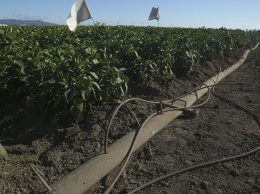Paso groups agree on water plan
IN THIS ARTICLE
- Agribusiness Topic
- Staff Report Author
By Staff Report Thursday, December 5th, 2013
With potentially expensive lawsuits looming in the background, two of the groups jockeying to shape the future of a water district in Paso Robles wine country have put aside their differences in hopes of avoiding years in court and millions of dollars in legal fees.
Groundwater levels in the Paso Robles area are dangerously low, forcing homeowners to spend tens of thousands of dollars drilling deeper wells and threatening the wine industry that has spurred economic growth. This summer, the San Luis Obispo County Supervisors enacted emergency pumping restrictions until a plan for managing the basin could be crafted.
PRO Water Equity, a group made up of small landowners and homeowners, and the Paso Robles Agricultural Alliance for Groundwater Solutions, or PRAAGS, made up of larger agricultural and wine interests, were vying to influence the eventual shape of the management plan. PRAAGS submitted a proposal for a new management district, but the homeowner group objected, saying that small landowners and the public would have too little voice in the proposed district.
Meanwhile, two new groups filed lawsuits over the Board of Supervisors’ emergency pumping restrictions, potentially tossing the entire issue into a protracted court battle. In so-called arbitrated groundwater basins, a judge oversees a plan for balancing water rights among users. In the Santa Maria Valley, a court-adminstered plan took more than a decade and cost $11 million.
The two Paso Robles landowner groups are hoping to avoid all that by agreeing to a plan that would go before San Luis Obispo County voters.
The preliminary agreement calls for a board that would be governed by seven members. Two of those members would be elected by large landowners, and two of the members would be elected by smaller landowners. The remaining three members would be elected by the public at large. Within each landowning class, votes would be determined by acreage owned.
“We believe this proposal provides fair and equitable representation for basin water users and a structure that meets the long-term needs of the area,” the groups said in a joint statement. “The proposed water district would be governed by locals, have the ability to obtain supplemental water, and could implement water management through an AB 3030 management plan. Development of the district will involve working through the LAFCO process and via special legislation.”












